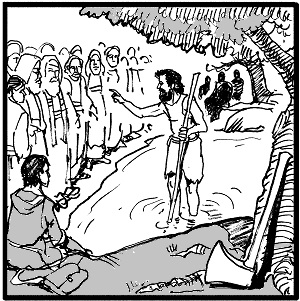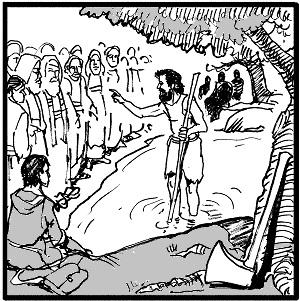

“I have baptized you with water; he will baptize you with the Holy Spirit” (Mark 1:8).
Second Sunday of Advent
Isa 40:1-5, 9-11; Ps 85; 2 Pet 3:8-14; Mark 1:1-8
Growing up in the 1950s and in a family of nine, long road trips were rare because of the logistics, once a year to and from a vacation spot in northern Minnesota. We had a station wagon that accommodated us, three per seat, the baby up in front with my parents, the “big” kids in the middle seat and the rest in a rear seat facing backward. The most frequently asked question from us was, “Are we there yet?”
The Second Sunday of Advent is a progress report on the story of salvation that defined God’s people on pilgrimage. Isaiah wrote to comfort the nation in exile with a vision of their return home. A whole generation had passed in captivity in Babylon, but now God would speed their return on a smooth highway through the desert. Mark’s Gospel begins by applying Isaiah’s cry in exile to the figure of John the Baptist. He is God’s messenger, a voice in the desert who is preparing the way for the Lord’s coming.
The return from exile had not brought salvation, only a continuation of the nation’s failure to heed the prophets and keep the Covenant. John’s ministry of baptism was about repentance for the forgiveness of sins. People flocked to the Jordan River in fear to get out ahead of God’s judgment. John described it as an “axe laid to the root of the tree” and a “winnowing fan” to separate the wheat from the chaff. John knew that his baptism with water was only preparation for a greater baptism of the Holy Spirit. They were not there yet. Something more transformative still had to happen, a second baptism of wind and fire.
With this opening scene Mark introduces a key theme into the Gospel message, the distinction between human righteousness and God’s redemptive mercy. Obeying the “thou shalt nots” in the Commandments was the minimum to clear the path for God’s gift of divine friendship. No human effort could earn or deserve that. Only the baptism of the Holy Spirit could bring the fire of God’s love. This gift was being offered to sinners and the righteous alike. This shocked John the Baptist, and he wondered if he had pointed to the wrong messiah in Jesus.
Advent is itself a sign of mercy to us. Our pilgrimage is not a single approach to God or one-time homecoming. It returns each year like a point on a spiral that invites us again and again to open our hearts to God’s ever-present gift of love and forgiveness. When we are humble enough to let God love us, despite our sins, we will at last understand the Gospel. This is more demanding than keeping the Law. Only then will we be ready to embrace the shocking mystery of Christmas.
Advertisement








